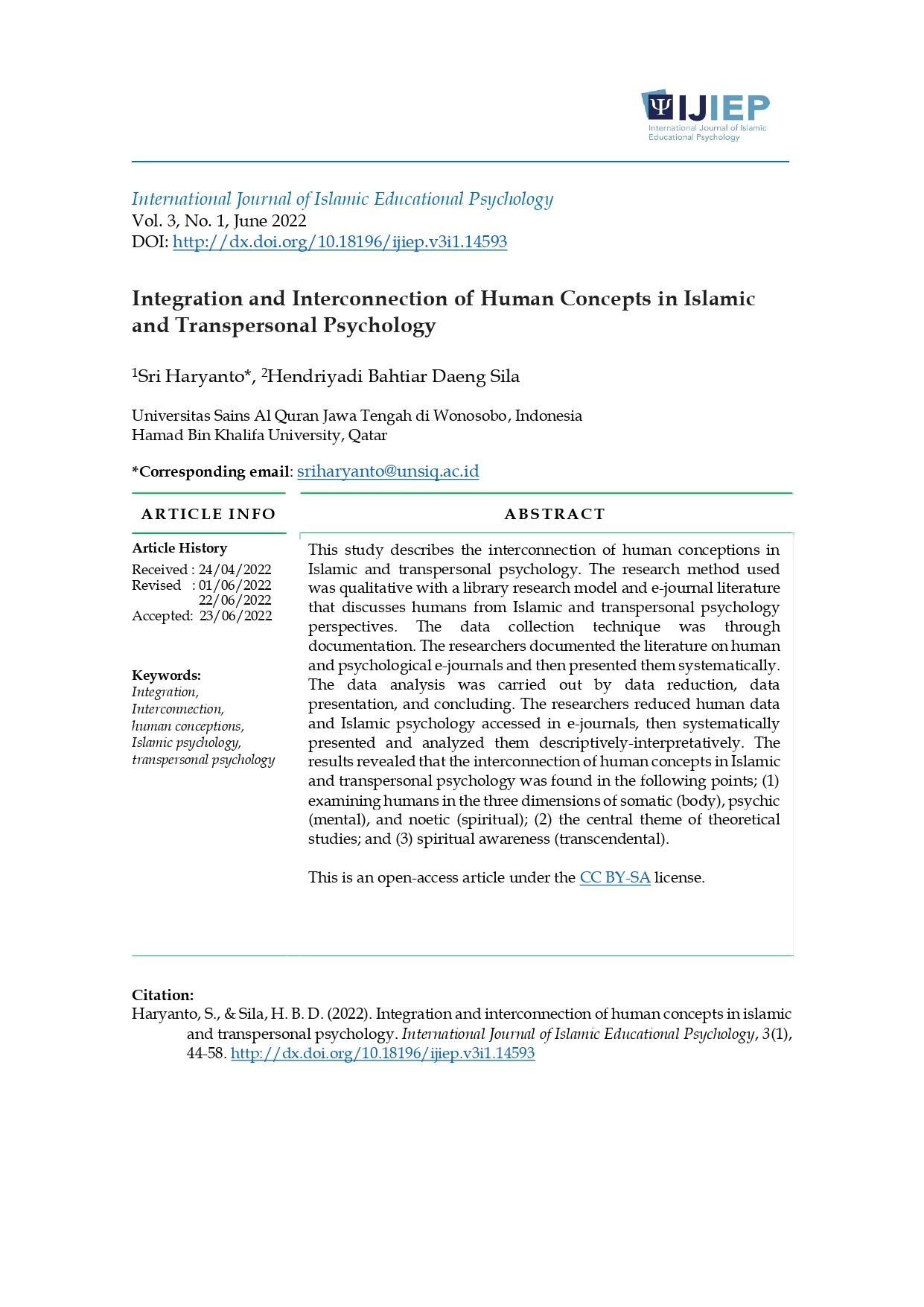Integration and Interconnection of Human Concepts in Islamic and Transpersonal Psychology
DOI:
https://doi.org/10.18196/ijiep.v3i1.14593Keywords:
integration, interconnection, human conceptions, islamic psychology, transpersonal psychologyAbstract
This study describes the interconnection of human conceptions in Islamic and transpersonal psychology. The research method used was qualitative with a library research model and e-journal literature that discusses humans from Islamic and transpersonal psychology perspectives. The data collection technique was through documentation. The researchers documented the literature on human and psychological e-journals and then presented them systematically. The data analysis was carried out by data reduction, data presentation, and concluding. The researchers reduced human data and Islamic psychology accessed in e-journals, then systematically presented and analyzed them descriptively-interpretatively. The results revealed that the interconnection of human concepts in Islamic and transpersonal psychology was found in the following points; (1) examining humans in the three dimensions of somatic (body), psychic (mental), and noetic (spiritual); (2) the central theme of theoretical studies; and (3) spiritual awareness (transcendental).References
Al-Ghazali, M. (1969). Misykah al-Anwar. Kairo: Dar al-Qudsiyah.
Al-Ghazali, M. (1964). Mi’raj al-Salikin, Kairo: Silsilat Al-saqafat al-Islamiyat.
Al-Ghazali, M. (1968). Ma'arij al-Quds, Kairo: Maktab al-Jundi.
Amuli, S. H. (1989). Inner Secrets of the Path. Element Books.
Anas, A. (2003). Menguak pengalaman sufistik: pengalaman keagamaan jamaah Maulid al-Diba’, Girikusumo. Pustaka Pelajar bekerjasama dengan Walisongo Press Semarang.
Ancok, J. (1995). Psikologi Islami. Yogyakarta: Pustaka Pelajar.
Azhari, A. (2004). Psikologi umum dan perkembangan. Jakarta: Teraju.
Baharuddin, D. (2004). Paradigma Psikologi Islami. Cet I. Yogyakarta: Pustaka Pelajar.
Bastaman, Hanna Djumhana. (2011). Integrasi Psikologi dengan Islam, Yogyakarta: Pustaka Pelajar.
Faizah, F., & Effendi, H. L. M. (2006). Psikologi dakwah. Kencana Prenada Media Group.
Frankl, V. E. (1985). Man's search for meaning. Simon and Schuster.
Nasution, H. (2013). Filsafat Islam. Jakarta: Gaya Media Pratama.
Jaenuddin, U. (2012). Psikologi Transpersonal, Bandung: Pustaka Setia.
Jamaluddin, D. (2006). Psikologi Islami, alternative pendekatan lewat kacamata Islam. Diskusi reguler jurusan Tasawuf Psikoterapi, Fakutas Ushuluddin.
Kartanegara, M. (2008). Kritik terhadap psikologi modern [Paper presentation]. Seminar: Diwesternisasi Pengetahuan dan Islamisasi Pengetahuan Kontemporer. Jakarta: Fakultas Ilmu Sosial dan Ilmu Politik Universitas Indonesia.
Mubarok, A. (2000). Jiwa dalam al-Qur’an: solusi krisis keruhanian manusia modern. Penerbit Paramadina.
Mubarok, A. (2001). Psikologi Dakwah. Jakarta: Pustaka Firdaus.
Mujidin, M. (2005). Garis Besar Psikologi Transpersonal: Pandangan Tentang Manusia Dan Metode Penggalian Transpersonal Serta Aplikasinya Dalam Dunia Pendidikan. Humanitas: Jurnal Psikologi Indonesia, 2(1), 24629.
Muhaya, A. (2018). Konsep psikologi transpersonal menurut Abu Hamid Muhammad Al-Ghazali. At-Taqaddum, 9(2), 142-158. https://doi.org/10.21580/at.v9i2.2063
Nawawi, R. S. (2000). Konsep manusia menurut Al-Qur;an dalam Metodologi Psikologi Islami. Yogyakarta: Pustaka Pelajar.
Najati, M. U. (2005). Psikologi dalam al-Qur’an: Terapi Qur’ani dalam pemyembuhan Gangguan Kejiwaan, Bandung: CV Pustaka Setia.
Poerwanto dkk, (1988). Seluk-beluk Filsafat Islam. Bandung: Rosdakarya.
Shihab, M. Q. (1996). Wawasan Al-Quran: Tafsir tematik atas pelbagai persoalan umat. Mizan Pustaka.
Zohar, D., & Marshall, I. (2007). SQ-Kecerdasan spiritual. Mizan Pustaka.
Zuhairini, Z. (2009). Filsafat Pendidikan Islam. Bina Aksara.

Downloads
Published
How to Cite
Issue
Section
License

- Share — copy and redistribute the material in any medium or format
- Adapt—remix, transform, and build upon the material for any purpose, even commercially.
The licensor cannot revoke these freedoms as long as you follow the license terms. Under the following terms:
- Attribution: You must give appropriate credit, provide a link to the license, and indicate if changes were made. You may do so in any reasonable manner, but not in any way that suggests the licensor endorses you or your use.
- ShareAlike: If you remix, transform, or build upon the material, you must distribute your contributions under the same license as the original.
- No additional restrictions — You may not apply legal terms or technological measures that legally restrict others from doing anything the license permits.






